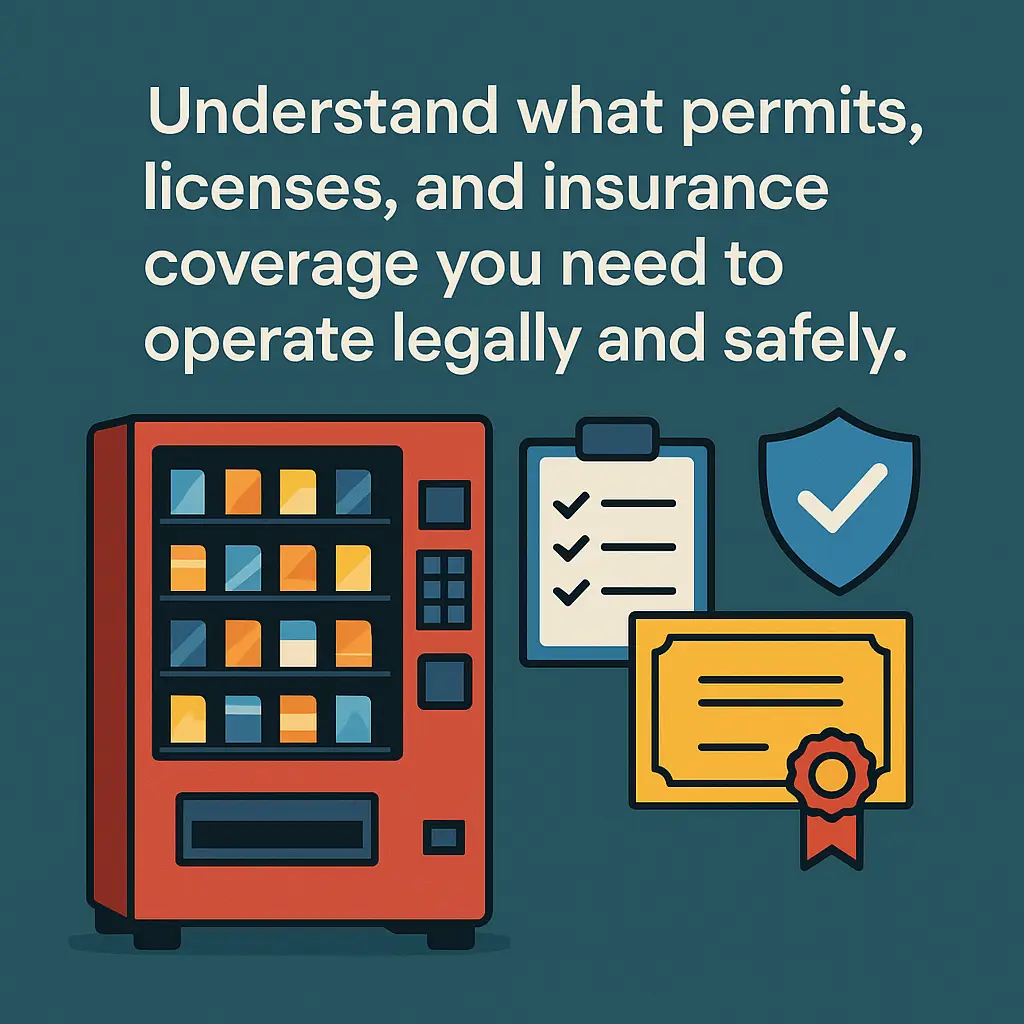Permits and Insurance for Vending Business
Understand what permits, licenses, and insurance coverage you need to operate legally and safely.
Back to Vending Business Startup ResourcesUnderstand what permits, licenses, and insurance coverage you need to operate legally and safely.
Back to Vending Business Startup ResourcesStart your 30-day free trial and get instant SMS and email alerts whenever a local business needs vending service. These are real location leads to help you grow your route — you decide which ones to buy, no obligations or contracts.
![]() Most states require a vendor license and sales tax permit
Most states require a vendor license and sales tax permit
![]() Business insurance protects against theft, damage, and liability
Business insurance protects against theft, damage, and liability
![]() Local health codes apply if food or drink is sold
Local health codes apply if food or drink is sold
30 days free, then $39 / month.
No Commitment. Cancel Anytime.

Starting a vending business involves more than just buying machines and finding locations. To operate legally and responsibly, you’ll need to secure the right permits, licenses, and insurance before placing your first machine. These legal requirements protect both your business and the customers you serve.
First, check whether your state requires a vending machine operator license or general business license. Many states expect you to register your company and collect sales tax. That means applying for a sales tax permit or reseller certificate with your state’s department of revenue. Keep in mind that in some cities or counties, you may also need local business registration or specific vending permits.
If you’re offering food or beverages, health department regulations may apply—especially for machines that hold perishable items. Some jurisdictions require food seller licenses, and health inspectors may check the machine’s condition and expiration dates periodically. Be sure to stay in compliance to avoid costly penalties or shutdowns.
Equally important is obtaining business insurance. At a minimum, general liability coverage helps protect you if someone is injured using your machine, or if your equipment damages someone’s property. You may also want business property insurance to cover your machines in case of damage, vandalism, or theft. If you plan to hire employees, workers’ compensation insurance is often legally required.
Insurance premiums are typically affordable, and getting coverage can give location owners more confidence in working with you. It also opens the door to bigger opportunities like public placements, offices, or schools that may require proof of insurance.
As your vending business grows, maintaining good records of your permits and insurance certificates across different locations becomes essential. Staying compliant helps you avoid fines, build trust, and operate smoothly in new markets.
For tips on servicing new accounts without cold calls, visit our page on getting vending accounts without cold calling. If you're early in your business journey, check out our guide on how to get locations if you're new to vending.
Vending Exchange connects vending operators with real businesses actively looking for vending services—including traditional machines, AI coolers, and office coffee. Get instant SMS and email alerts when new opportunities are available in your area. No contracts or monthly fees—just buy the leads you want. Start your free 30-day trial today and grow your vending business on your terms.
Yes, most states and cities require a business license to operate a vending machine business, even if you're running it as a sole proprietor.
At minimum, you should have general liability insurance. Many operators also carry property insurance and, if you hire help, workers’ comp.
You can usually apply through your state's department of revenue or licensing department. Some cities also require additional local registration.
Yes, in most cases. If you plan to sell taxable items, you need a state sales tax permit to collect and remit sales tax.
If you're selling perishable items like sandwiches or dairy, local health departments may require inspection and a food vendor license.
Often yes, but some cities may require a separate permit for each machine or location, especially in public spaces.
General liability insurance typically ranges from $300–$600 per year. Costs vary depending on machine type and location volume.
Operating without required permits can result in fines, business closure, or loss of access to locations. Stay compliant to avoid issues.
It covers injuries to people and property damage caused by your machines, helping protect your business from lawsuits.
Not always. You’ll likely need business property insurance to protect machines from theft, vandalism, or damage.